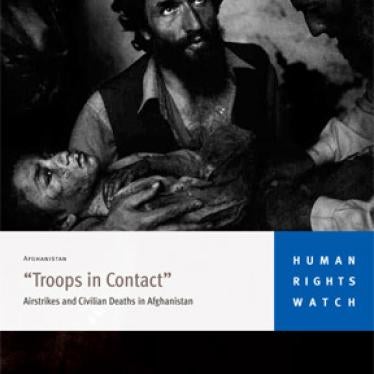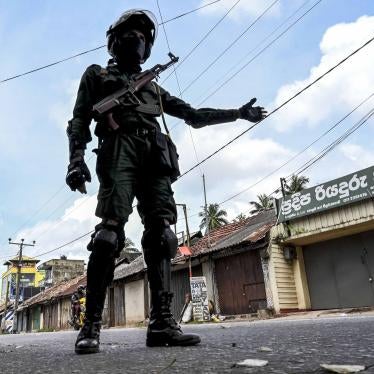(New York) - The US military's investigation into deadly and controversial airstrikes in Azizabad in Afghanistan in August 2008 was deeply flawed, Human Rights Watch said today in a letter to US Secretary of Defense Robert Gates.
On October 1, 2008, the Department of Defense published a summary of a report by Brig. Gen. Michael Callan of its investigations into US airstrikes on the village of Azizabad in Herat province on August 21-22, 2008. Since that time, Human Rights Watch has conducted additional research into the events surrounding the Azizabad airstrikes, reviewed the facts presented in the summary, and analyzed the Callan investigation's methodology.
"The weaknesses in the Callan investigation call into question the Defense Department's commitment to avoid civilian casualties," said Brad Adams, Asia director at Human Rights Watch. "Unless the new Obama administration urgently addresses the US military's airstrike practices in Afghanistan, more unnecessary civilian deaths and injuries will result."
Separate investigations conducted by the United Nations, the government of Afghanistan, and the Afghan Independent Human Rights Commission concluded 78 to 92 civilians had been killed at Azizabad, the majority of them women and children. For weeks after the incident, the US strongly rejected all three investigations. An initial US military inquiry by the Combined Joint Task Force 101 concluded that no more than five to seven civilians and 30 to 35 Taliban fighters had been killed. In various media interviews, US officials suggested that the villagers were spreading Taliban propaganda.
After the release of video showing significant numbers of civilian dead, and strong criticism from Afghan President Hamid Karzai and the UN, the US announced on September 7 that it would conduct a new investigation led by General Callan.
The Callan report summary accepted a larger figure for the number of dead - 33 civilians - but rejected the much higher civilian death tolls reported by the UN, the Afghan Independent Human Rights Commission, and the Afghan government, and criticized their methodology. It failed to acknowledge any flaws in the initial US assessments, and it dismissed villager testimony as financially or politically motivated.
The summary concluded that the US attack on insurgent forces in Azizabad was "necessary" and "proportional," failing to acknowledge any possible mistakes in US intelligence. It exonerated the US forces who carried out the attack of any wrongdoing without providing a basis for its conclusions, and suggested without evidence that Taliban forces deliberately used civilians as "shields."
Flaws in the Callan investigation that may have led to a lower US estimate of civilians killed include: the dismissal of villager testimony about numbers killed, the rejection of consistent claims that some graves contained more than one body, and the assumption that almost all the men who died were insurgents.
"There was great hope in Afghanistan that the Callan report would provide a credible and detailed analysis of the Azizabad airstrikes, place blame where it fell, lead to appropriate disciplinary action, and result in operational changes that would avoid such tragedies in the future," said Adams. "Unfortunately, this has not happened."
Human Rights Watch recommended that the US government:
- Ensure that air attacks comply with the legal obligation to take all feasible precautions to minimize harm to civilians.
- Stop using airstrikes in densely populated areas unless the intelligence is highly reliable and the target has been visually identified. It is critical that US forces improve their assessments on the ground before they employ close air support, taking into account the risk of misinformation or disinformation from sources.
- Refrain from using 105mm howitzers or similar area-effect weapons against targets in densely populated areas.
- Thoroughly investigate the collateral damage- and battle damage-assessment processes to determine how they can be improved to reduce civilian casualties, and make appropriate changes.
- Provide accurate and timely information on civilian casualties in military operations.
- Take responsibility for civilian casualties when that is warranted and take appropriate disciplinary or criminal action against those responsible.
Human Rights Watch urged the Defense Department to publicly release the Callan report.
"We deeply regret the Pentagon's decision not to declassify and publish the full report of the Azizabad investigation," said Adams. "In the interests of bringing to public attention the investigation's methodology, analysis, and findings, we urge Defense Secretary Gates to reconsider that decision."
Human Rights Watch said that the US and its allies have made some positive operational changes and commitments to try to reduce civilian casualties, particularly in Tactical Directives issued on September 2 and December 8 and in various statements to the media by political and military leaders.
"The US still needs to change its policies and practices on airstrikes to end the string of attacks that have caused so much loss of civilian life," said Adams. "Otherwise the planned arrival of 20-30,000 more troops in Afghanistan may lead to greater, not fewer, civilian deaths."
In September 2008 Human Rights Watch issued a report on the problem of civilian casualties from airstrikes, "‘Troops in Contact': Airstrikes and Civilian Deaths in Afghanistan" (https://www.hrw.org/en/reports/2008/09/08/troops-contact-0), which made detailed recommendations of ways to avoid civilian casualties.







